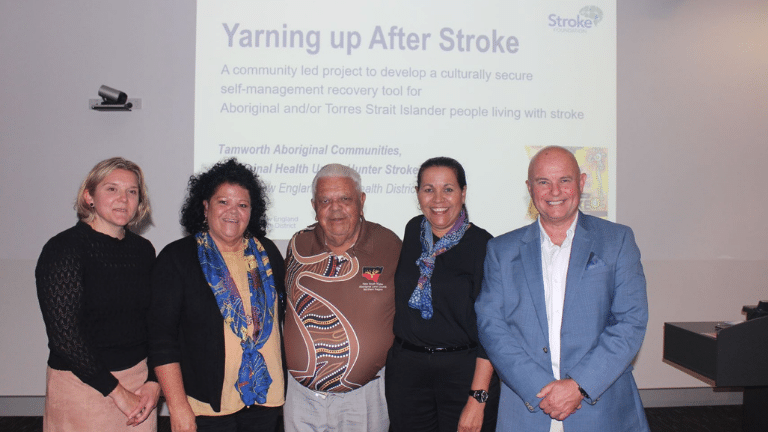
Four Hunter research teams have secured more than $6 million in funding through the Australian Government’s Medical Research Future Fund, bolstering HMRI and the University of Newcastle’s commitment to better, healthier living within our regions and beyond.

Pictured: The team leading Yarning Up After Stroke project, aiming to reduce to inequality in healthcare for Indigenous Australians living with stroke.
Four Hunter research teams have secured more than $6 million in funding through the Australian Government’s Medical Research Future Fund, bolstering HMRI and the University of Newcastle’s commitment to better, healthier living within our regions and beyond.
SMS4dads support service secures regional rollout
Building on an impressive trajectory of parental intervention, the unique SMS4dads service has been successful in securing more than $2.5 million to support new fathers in rural and remote areas of Australia.
SMS4dads engages and connects with men as they transition to fatherhood, delivering texts linked to online resources addressing father-infant and father-partner relationships and regularly checking on their wellbeing and mental health. SMS4dads addresses the lack of information for new fathers in rural areas and the difficulty accessing parenting and mental health services outside of the major cities.
The project will target all fathers living outside the capital cities but will provide additional resources for three underserviced population groups: partners of new mothers with mental illness; young Indigenous fathers; and fathers whose partners have miscarried or where the infant has died.
HMRI would like to acknowledge the Traditional Custodians of the land on which we work and live, the Awabakal and Worimi peoples, and pay our respects to Elders past and present. We recognise and respect their cultural heritage and beliefs and their continued connection to their land.

Hunter Medical Research Institute
We’re taking healthy further.
Locked Bag 1000
New Lambton
NSW, Australia, 2305



This site is protected by reCAPTCHA and the Google Privacy Policy and Terms of Service apply.
Copyright © 2024 Hunter Medical Research Institute | ABN: 27 081 436 919
Site by Marlin Communications
